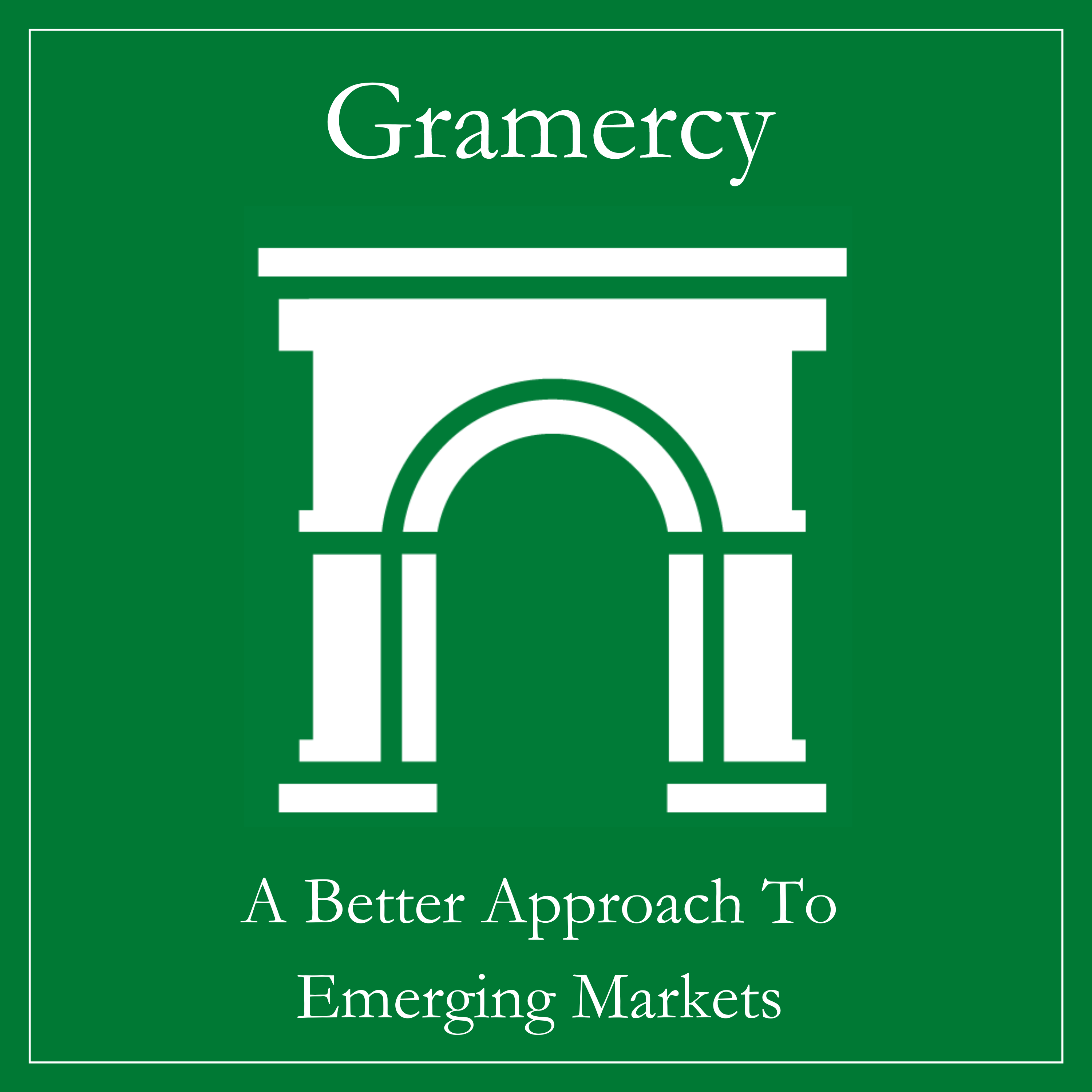Contents
Market Overview
Macro Review
Markets received happy news on the last Friday in June as the Fed’s preferred measure of underlying inflation in the U.S. economy, the Core Personal Consumption Expenditure (PCE) Index, decelerated in May on both a MoM and a YoY basis and printed at multi-year lows. This bolstered the case for monetary policy easing this year, providing a plausible path to at least one Fed rate cut this year, potentially in September. Stocks gained while UST yields fell, reversing pre-PCE release weakness. In Europe, assets in the euro area periphery continued to underperform core assets as risk-off sentiment prevailed ahead of a highly uncertain first round of the French Legislative Elections on Sunday. Meanwhile, Olli Rehn, member of the ECB’s Governing Council and Bank of Finland’s Governor, characterized investor expectations of two additional rate cuts by the ECB in 2024 as “reasonable”, infusing a bit of optimism into European assets. In EM, Turkey’s Central Bank held its policy rate at 50% and reiterated a hawkish bias. Mexico’s Banxico also remained on hold amid resilient growth, sticky inflation, and MXN volatility in the post-election environment. The Czech National Bank surprised with a 50bps rate cut vs 25bps expected by markets, which weighed on the CZK. The week also witnessed a degree of political risk escalation in EM as Kenya’s President Ruto decided to revoke proposed revenue-raising measures amid deadly protests while Bolivia experienced a failed coup attempt led by the top Army Commander.
EM Credit Update
Emerging markets sovereign credit (cash bonds) were marginally weaker (-0.1%) with spreads 1bp wider. Sovereign outperformers were Colombia, Guatemala, and Angola, while Iraq, Bolivia, and Mongolia underperformed. Corporate credit was flat at the index level with spreads flat as well. EM local debt gave back almost all last week’s outperformance, losing 0.4% this week.
The Week Ahead
Next week is a short one in the U.S. due to Independence Day celebrations, but focus will be on European political dynamics as markets digest the results of Sunday’s first round of the French Legislative Elections and prepare for the UK General Election on Thursday. In terms of economic data next week, the monthly jobs report and ISM indices in the U.S., inflation in Europe and the PMIs in China will be on the docket. Several other Asian economies will also publish PMIs as well as inflation prints for June in Indonesia, the Philippines, South Korea and Taiwan. Other highlights include the latest FOMC meeting minutes, the ECB’s account of the June meeting and ECB’s forum in Sintra, Portugal.
Highlights from emerging markets discussed below: Kenya President Ruto revokes proposed revenue-raising measures amid deadly protests; Banxico remained on hold amid resilient growth, sticky inflation and peso volatility; the Central Bank of Turkey (CBT) holds policy rate at 50%, reiterates hawkish bias; and Bolivia failed coup attempt underscores fragilities.
Fixed Income
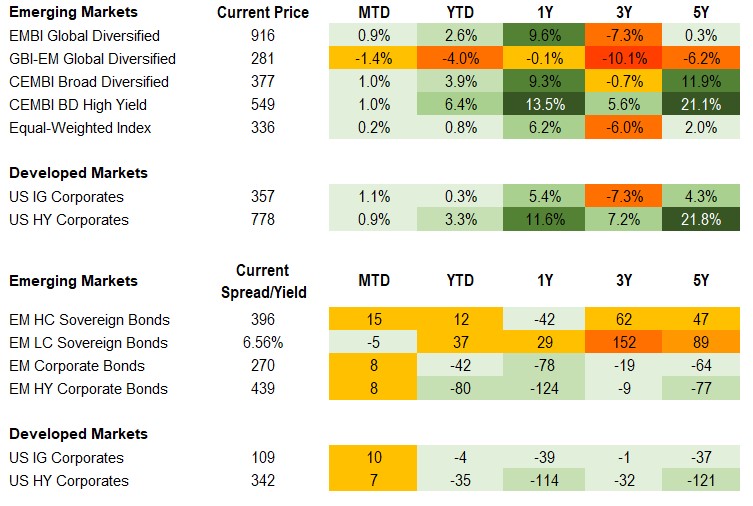
Equities
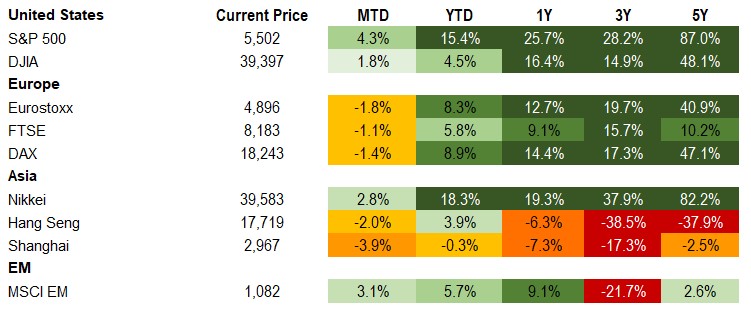
Commodities

Source for data tables: Bloomberg, JPMorgan, Gramercy. EM Fixed Income is represented by the following JPMorgan Indicies: EMBI Global, GBI-EM Global Diversified, CEMBI Broad Diversified and CEMBI Broad High Yield. DM Fixed Income is represented by the JPMorgan JULI Total Return Index and Domestic High Yield Index. Fixed Income, Equity and Commodity data is as of June 28, 2024 (early-afternoon).
Emerging Markets Weekly Highlights
Kenya President Ruto revokes proposed revenue-raising measures amid deadly protests
Event: Ongoing protests against proposed tax increases in Kenya’s 2024 finance bill turned deadly this week. In response, President William Ruto made an abrupt policy shift, declaring that the bill will be withdrawn and announcing cost-cutting measures to replace forgone revenue increases.
Gramercy Commentary: While negative political implications for President Ruto could emerge over the medium-term from his handling of the crisis, the near-term effect of his abrupt policy U-turn should appease the violent protests that claimed several lives this week and paralyzed parts of the country. Also, a shift toward expenditure cutting rather than revenue raising measures should improve the quality of the fiscal consolidation effort that Kenya needs. However, the expenditure cuts and efficiency measures announced thus far will not be sufficient to compensate for the forgone potential additional revenues targeted by the now revoked finance bill. As such, the authorities will have to come up with a new strategy to meet conditionality of the IMF program that has recommended a “front-loaded fiscal adjustment”. While we expect strong international support and goodwill for Kenya to persist, including from a friendly White House and an accommodative IMF, balancing strengthening government finances and maintaining social/political stability is likely to become more challenging for the Ruto Administration going forward.
Banxico remained on hold amid resilient growth, sticky inflation and peso volatility
Event: On Thursday, Mexico’s Central Bank held its policy rate at 11.0%. This followed peso volatility in the aftermath of the presidential election as well as resilient growth and sticky inflation data. Retail sales growth in sequential terms in April printed 70bps stronger than market consensus and the prior month’s print while the monthly economic activity index beat estimates on an annualized basis. Sequentially, the index contracted 0.62% m/m indicating some cooling. On inflation, the bi-weekly headline and core prints accelerated in sequential and annual terms.
Gramercy Commentary: We see a more hawkish and cautious approach to monetary policy in the near-term as a necessary element for renewed peso stability. The 4-1 decision coupled with a statement that acknowledged recent volatility in financial markets and noted the balance of risks to growth as biased to the downside while the inflation risk as biased to the upside suggests the policy rate will likely be kept on hold at least until the next meeting in August.
The Central Bank of Turkey (CBT) holds policy rate at 50%, reiterates hawkish bias
Event: The CBT maintained its main policy interest rate, the one-week repo rate, at 50%, and continued to signal readiness to deliver additional monetary tightening should the inflation outlook deteriorate.
Gramercy Commentary: The CBT’s monetary policy management and forward guidance continue to support Gramercy’s constructive view on the Turkish sovereign credit story and assets. Minister of Finance Mehmet Simsek’s macroeconomic normalization program appears to continue to enjoy President Erdogan’s support, which is the critical signpost for markets. The next important signal in that context will come from the authorities’ decision on a mid-year, minimum wage hike in July. A decision to forgo a potential hike will support the CBT’s projected disinflation path in the second half of the year as well as the market credibility of Simsek’s economic adjustment strategy.
Bolivia failed coup attempt underscores fragilities
Event: On Wednesday, an attempted coup led by then Army Commander Juan Jose Zuniga was successfully stopped. Zuniga was replaced by new Army General Jose Wilson Sanchez.
Gramercy Commentary: The potentially coordinated coup is unlikely to meaningfully bolster popular support for President Arce as political dysfunction within the ruling MAS party persists and social conditions are strained amid the ongoing dollar crunch and expanding macroeconomic imbalances. Absent political and macroeconomic change, we expect FX reserve levels to remain at very low levels and the risk of default to remain elevated particularly as maturities step-up beyond 2025.
Emerging Markets Technicals
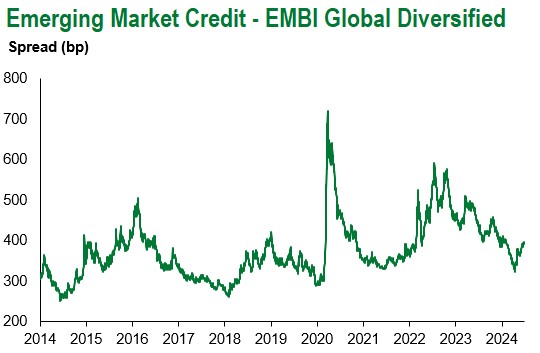
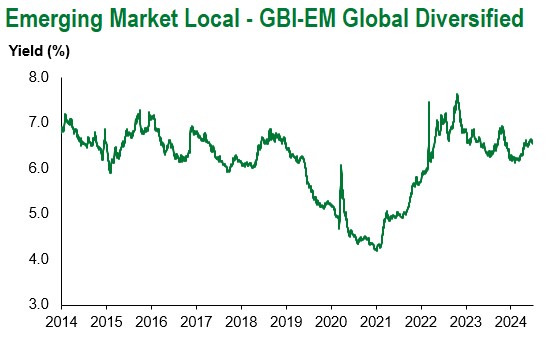

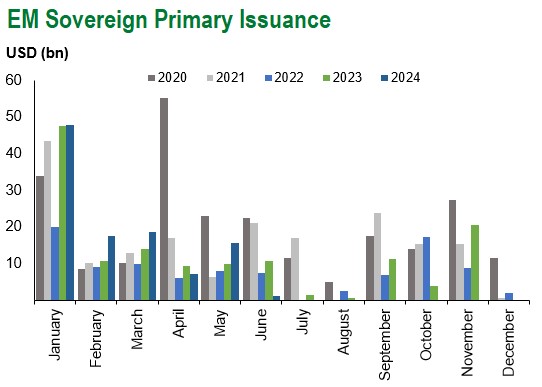
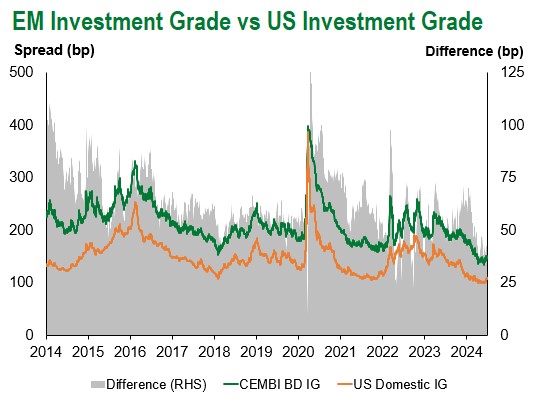
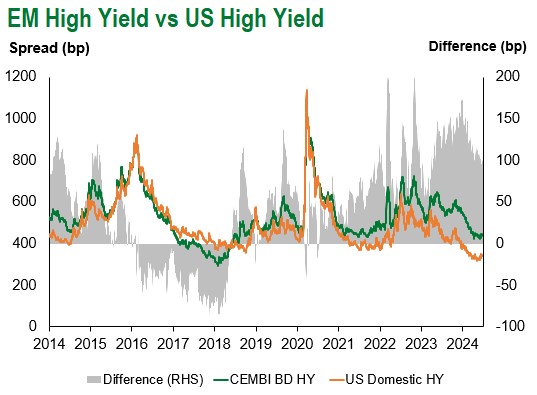

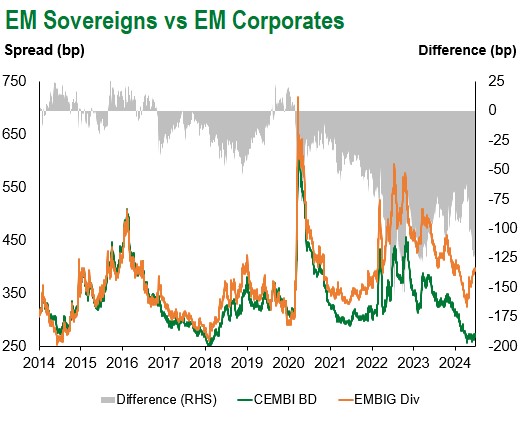
Emerging Markets Flows
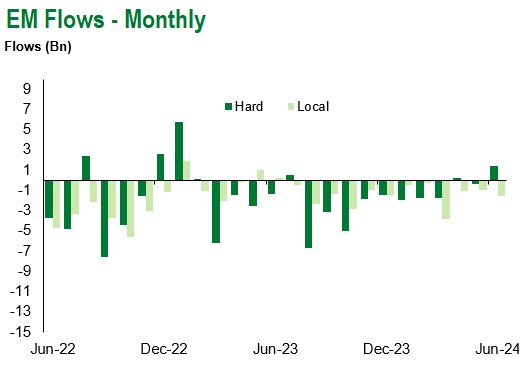
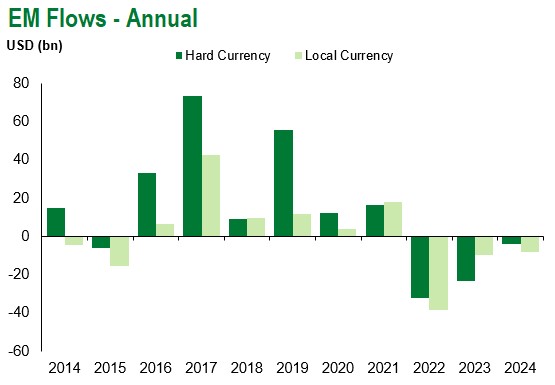
Source for graphs: Bloomberg, JPMorgan, Gramercy. As of June 28, 2024.
For questions, please contact:
Kathryn Exum, CFA ESG, Director, Co-Head of Sovereign Research, [email protected]
Petar Atanasov, Director, Co-Head of Sovereign Research, [email protected]
James Barry, Director, Deputy Portfolio Manager, [email protected]
This document is for informational purposes only. The information presented is not intended to be relied upon as a forecast, research or investment advice, and is not a recommendation, offer or solicitation to buy or sell any securities or to adopt any investment strategy. Gramercy may have current investment positions in the securities or sovereigns mentioned above. The information and opinions contained in this paper are as of the date of initial publication, derived from proprietary and nonproprietary sources deemed by Gramercy to be reliable, are not necessarily all-inclusive and are not guaranteed as to accuracy. This paper may contain “forward-looking” information that is not purely historical in nature. Such information may include, among other things, projections and forecasts. There is no guarantee that any forecasts made will come to pass. Reliance upon information in this paper is at the sole discretion of the reader. You should not rely on this presentation as the basis upon which to make an investment decision. Investment involves risk. There can be no assurance that investment objectives will be achieved. Investors must be prepared to bear the risk of a total loss of their investment. These risks are often heightened for investments in emerging/developing markets or smaller capital markets. International investing involves risks, including risks related to foreign currency, limited liquidity, less government regulation, and the possibility of substantial volatility due to adverse political, economic or other developments. References to any indices are for informational and general comparative purposes only. The performance data of various indices mentioned in this update are updated and released on a periodic basis before finalization. The performance data of various indices presented herein was current as of the date of the presentation. Please refer to data returns of the separate indices if you desire additional or updated information. Indices are unmanaged, and their performance results do not reflect the impact of fees, expenses, or taxes that may be incurred through an investment with Gramercy. Returns for indices assume dividend reinvestment. An investment cannot be made directly in an index. Accordingly, comparing results shown to those of such indices may be of limited use. The information provided herein is neither tax nor legal advice. Investors should speak to their tax professional for specific information regarding their tax situation.
